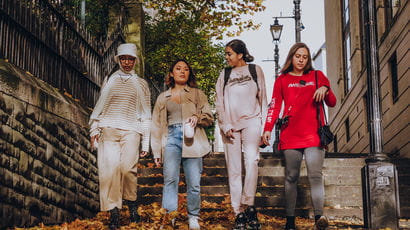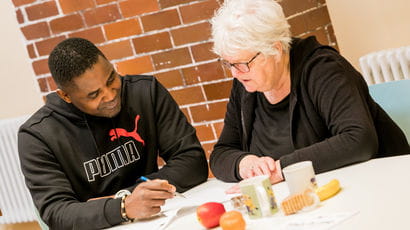Greater Manchester mental health partnership
A case study on the Greater Manchester Universities Student Mental Health Service pilot.
The pilot Greater Manchester Universities Student Mental Health Service was launched in September 2019, offering a single designated mental health care pathway for students across the region, with access routes through existing university services. The service enables students with significant difficulties and complex needs to receive specialist interventions as part of a single pathway that extends through university-based services directly into the specialist service.
The service is a partnership between University of Manchester, Manchester Metropolitan University, University of Salford, University of Bolton and Royal Northern College of Music, together with the Devolved Authority and the Greater Manchester Health and Social Care Partnership.
Service evaluation
The establishment of the Greater Manchester Universities Student Mental Health Service (GMUSMHS) itself was not within the scope of the Student Mental Health Partnership project. The Greater Manchester Hub carried out a peer-led evaluation, co-produced with student partners, between September 2020 and December 2021. The aim was to understand the experiences and journeys of service users, and to support the development of the service.
Co-production (in this case, supporting the student partners to bring their expertise of the student domain and mental health support services, to take ownership of the work, and to work confidently with NHS and Higher Education Institution (HEI) staff) was employed in all areas of the project. This particularly benefited the process of understanding, empathising, and building rapport and trust with student service users in workshops and interviews. This resulted in an authentic and in-depth sharing of experiences from the service users, and provided a unique view into the student perspective to share with the GMUSMHS and stakeholders.
After the evaluation, a Sense-making Session was held with staff to contextualise the service users’ experiences using the service and clinical expertise of the staff. This approach allowed the complexity of service users’ experiences and service delivery to be acknowledged, and created a forum for staff and student partners to work together as a community to identify strengths, weaknesses and future developments. The peer-led nature of the evaluation, with student partners bringing their lived experience of the student domain and the understanding they built with service users, allowed the voice of the service users to be authentically represented during the session. At the same time, the staff’s understanding of the service and their clinical expertise was required to develop sustainable and appropriate strategies that the staff could commit to.
Early data showed that the new service was receiving far fewer referrals from male students than female. As a result, a focused investigation into the low numbers of male students presenting at the service was undertaken. This aimed to understand the views of male students in Greater Manchester about mental health and their experiences with mental health and mental health services, and their patterns and behaviours regarding access to and engagement with mental health services. A male student partner carried out a survey and designed a co-produced workshop with students called ‘build your own mental health service’, leading to a report and presentation of findings.
Student co-production
Ten student partners from the five Greater Manchester HEIs were employed to work on the evaluation. An additional male student partner was employed later in the project to explore low male engagement with services. The student partners came from a wide range of disciplines including music, medicine, social sciences and psychology.
Students’ Union officers from the five HEIs contributed to the exploration of the initial aims, as well as the development of the job description for the student partners and the recruitment process.
Student partners were involved in design and delivery of interviews and workshops with service users, data analysis and producing deliverables. They were also responsible for participant recruitment and administration. Student partners were given a high level of ownership over the work, where they were supported to generate and follow their own ideas from workshop methods through to the media to use for deliverables. They formed a self-resourcing team that didn’t rely on the traditional student-supervisor hierarchical dynamic, and as a result were able to produce creative and ambitious outputs.
An example of this was the use of “I-poems”, a creative analysis method generated from the workshop and interview material. This involved identifying quotes from each transcript that start with “I”, or similar personal statements, and then arranging the quotes to form a poem for that participant. The quotes are kept as close as possible to the original statement, with some artistic licence required to create a poetic output. I-poems provide an opportunity to “give voice” to student service users by presenting their journey in their own words. This demonstrated the student partners’ skills at developing a peer level relationship with the service users to understand which aspects of their journey were most important to them.
The student partners produced a series of nine podcast episodes, Trust me, I’m a student, sharing their experiences of co-production. This led to presentations at the UUK Mental Health in HE conference and at a SMaRteN (Student Mental Health Research Network) seminar. A pdf guide to co-production to accompany the podcast was also produced.
Impact
The evaluation indicated that the majority of students had a positive view of the service. In particular, they appreciated the expertise and passion of the staff – this was the often the case even when they were dissatisfied with the care received. Areas of strength identified were referral, crisis support, and one-to-one sessions, with group sessions receiving mixed reviews. Areas for development were the discharge process and inclusivity. Students shared the positive impact the care had on their mental health, daily lives and academic work (not present in every case).
Interviews and the Sense-making Session with staff demonstrated the strong team ethos within the service, an understanding of the development areas highlighted, and a willingness to continue to work with students to provide the best care possible.
The research with male students found that they were less likely to access mental health services because of societal stigma, previous negative experiences, and poor mental health literacy. Male students who had previously accessed mental health services preferred one-on-one conversations with a mental health professional, and problem-based therapies over introspective ones. This work is helping to inform the GMUSMHS in their engagement with this cohort.
The project delivered a presentation of evaluation findings to the GMUSMHS board that gave an insight into both student and staff perspectives of the service, and presented recommendations across three overarching themes: thoughts about staff and the service generally; care needs; and impact and outcomes.
Funding for the GMUSMHS has now been agreed for a further three years. The evaluation aims, by sharing the journeys of the service users with the GMUSMHS, to help improve care and care pathways for students. However, it is currently too early to clearly identify what improvements will result. The project has recommended to the GMUSMHS board that they continue to champion student-led engagement at the service, building on learning from the evaluation.
Student Mental Health Partnerships Project
UWE Bristol led a partnership across the Higher Education sector to improve care for students in need of mental health support through the development and evaluation of local partnerships between universities, the NHS and Students’ Unions, connected via a National Learning Collaborative.
Student Mental Health Partnerships ProjectYou may also be interested in

Liverpool mental health partnership
A case study on the Liverpool mental health partnership.

North London mental health partnership
A case study on the North London mental health partnership.

Sheffield Hub mental health partnership
A case study on the Sheffield mental health partnership.

Bristol Hub mental health partnership
A case study on the Bristol mental health partnership.
